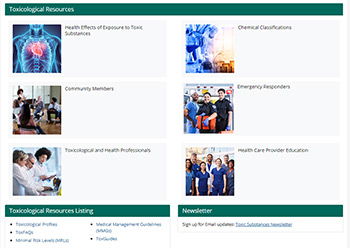Trichloroethylene Poisoning
Patient Education and Care Instruction Sheet
- Overview of Trichloroethylene(TCE)
- How Might I Be Exposed to TCE?
- How Can TCE Affect My Health?
- How Can TCE Affect the Health of Children?
- How Can I Reduce the Risk for TCE Poisoning?
- What Tests Can Show if I Have Been Exposed to TCE?
- When to Call Your Doctor
- Clinical Follow-up Instructions
- Additional Information and Resources
Course: SS4561
CE Original Date: 08/05/2022
CE Expiration Date: 08/05/2024
Download Printer-Friendly Version [PDF – 586 KB]
TCE is a manufactured chemical. It is a clear, colorless, nonflammable liquid with a sweet, fruity smell that easily evaporates.
TCE is in many products, such as the following:
- Refrigerants in automobile air conditioners
- Solvents for degreasing metal parts
- Spot-removers used for dry cleaning
- Arts and crafts spray coatings
People living in the United States are or have been exposed to TCE because of its widespread use. Workers in industries using TCE generally are exposed at higher levels of TCE than are other people. People can be exposed to TCE at lower levels in the air, drinking water, certain products they buy, and contaminated foods. Indoor air often has higher levels of TCE than outdoor air if TCE-containing products have been used in the house.
Breathing TCE in contaminated air is the most common route of exposure for most people, and the route that most commonly leads to illness.
TCE can be harmful to people. Studies show that workers who are exposed to moderate amounts of TCE might get headaches, feel dizzy, or become sleepy. Exposure to large amounts of TCE can cause coma and even death.
Symptoms seen in humans from short-term and long-term exposure were similar.
TCE can harm the central nervous system and damage the kidneys, liver, immune system, male reproductive system, and the developing embryo or fetus. Scientific studies have shown that TCE can cause kidney and liver cancer and non-Hodgkin’s lymphoma in humans.
Some human studies indicate that TCE exposure can cause pregnancy losses and various birth defects. Exposure can decrease growth or birth weight of children and alter immune system function. In some animal studies, exposure to TCE during development might have caused low body weight and higher rates of heart defects. Exposure also might cause changes in the developing nervous system and affect the immune system. TCE is expected to affect children in the same way it affects adults. We do not know whether children are more affected by TCE than are adults.
The following steps might reduce the risk for TCE poisoning:
At Home
- Avoid drinking water from sources known to be contaminated with TCE.
- Use safer alternatives to products with TCE.
- When using products containing TCE indoors, make sure to have plenty of ventilation. To increase airflow, you could open your windows and use fans.
- Use TCE-containing products outdoors when possible.
- Wear appropriate personal protective equipment, such as a proper respirator, protective gloves, or both when using products that contain TCE.
- Keep children from playing in dirt or eating dirt if you live near a waste site that has TCE.
At Work
- The Occupational Safety and Health Administration (OSHA) requires that employers provide labeling, safety data sheets (SDS), and safety training on use of chemicals in the workplace.
- Be sure to use the employer-supplied personal protective equipment — gloves, goggles, mask, and respirator — as recommended.
- Read employer-provided SDS on products that you use.
- Be sure all containers of chemicals are properly labeled.
- Attend employer-provided training on how to use chemicals safely at work.
TCE and its breakdown products can be measured in blood and urine. However, many factors affect these results. Those factors include the time between last exposure and sample collection, total body fat, activity level, and metabolism.
Laboratories use special equipment to detect and measure TCE. Many hospitals do not have this equipment. Even if a TCE test shows recent exposure, we might not be able to match a TCE level in blood, urine, or breath to specific health effects.
If you are concerned about possible exposure to TCE, contact your doctor. Some symptoms to watch for include the following:
- Central nervous system problems
- Changes in health, especially those affecting your heart, liver, or kidneys
Signs and symptoms of central nervous system problems might include the following:
- Loss of control of body movement
- Loss of speech or trouble talking
- Drowsiness
- Irritation
- Restlessness
- Disorientation
Signs and symptoms of heart disease might include the following:
- High or low blood pressure
- Irregular heart beat
- Chest pain
- Dizziness
- Fatigue
- Loss of appetite
- Shortness of breath
- Swelling in the legs, ankles, or feet
- Blackouts, fainting, vomiting, or lightheadedness
Signs and symptoms of kidney disease mighty include the following:
- Decreased urine output
- Swelling in the legs, ankles, or feet
- Chest pain or pressure
- Drowsiness
- Shortness of breath
- Fatigue
- Confusion
- Nausea
- Seizures or coma
No follow-up appointment is needed unless you develop any of the symptoms listed above.
Return for laboratory testing: ___________________
Return to the emergency department/clinic on (date) ____ at _____ AM/PM for a follow-up examination.
Do not perform vigorous physical activities for 1 to 2 days.
You may resume everyday activities, including driving and operating machinery.
Do not return to work for _____days.
Avoid exposure to cigarette smoke for 72 hours. Smoke can worsen the condition of your lungs.
Avoid drinking alcoholic beverages for at least 24 hours. Alcohol can worsen injury to your nervous system or have other effects.
Avoid taking the following medicines: ________________________________________
Tell the emergency department the name and number of your doctor so they can send that person a record of your emergency department visit.
Other instructions: _______________________________________________________________________
___________________________________________________________________________________________
___________________________________________________________________________________________
___________________________________________________________________________________________
